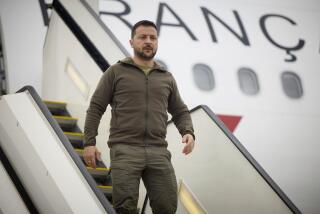Summit Pleases Allies but Problems Remain--Bush
- Share via
WASHINGTON — President Bush said today that U.S. allies gave the superpower summit a “very, very positive” review even as he acknowledged that “there’s some problems” that remain to be solved.
Bush said he conferred late Sunday by phone on the outcome of the summit with West German Chancellor Helmut Kohl, British Prime Minister Margaret Thatcher and former President Ronald Reagan--who met in San Francisco today for breakfast with Soviet President Mikhail S. Gorbachev.
Bush dispatched Secretary of State James A. Baker III to Copenhagen, Denmark, today to meet with his Soviet counterpart and Germany’s foreign minister about European security following the unification of Germany.
“I am pleased with the results and I think the reception from the American people was rather clear,” Bush said as he began to brief his Cabinet on the four-day meeting with Gorbachev.
He won a sustained round of applause from the Cabinet--the friendliest audience in town--as be braced for a congressional cold shoulder over the provisional trade agreement that so pleased Gorbachev.
“There’s some problems,” Bush told the Cabinet at brief remarks during a picture-taking session. “I never said there wouldn’t be.”
The President said he talked to Reagan--who had five summits of his own with the Soviet leader--to “give him a briefing as to what he might anticipate at his breakfast.”
“The mood . . . from the allies so far, the ones I’ve talked to, has been very, very positive,” Bush said.
“We’ll have to wait and see what the response is from around the world. But so far our experts have been very pleased,” Bush said.
Presidential spokesman Marlin Fitzwater said later today that Gorbachev’s threat to suspend exit visas for Soviet Jews could cause “some problems,” suggesting that it does not square with the Soviet leader’s assurances of freer emigration policies.
Gorbachev on Sunday suggested that he will consider suspending the visas if Israel continues to settle the emigrants in occupied territories.
“We view it with concern. We want open emigration,” Fitzwater said.
More to Read
Get the L.A. Times Politics newsletter
Deeply reported insights into legislation, politics and policy from Sacramento, Washington and beyond. In your inbox twice per week.
You may occasionally receive promotional content from the Los Angeles Times.










